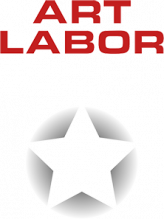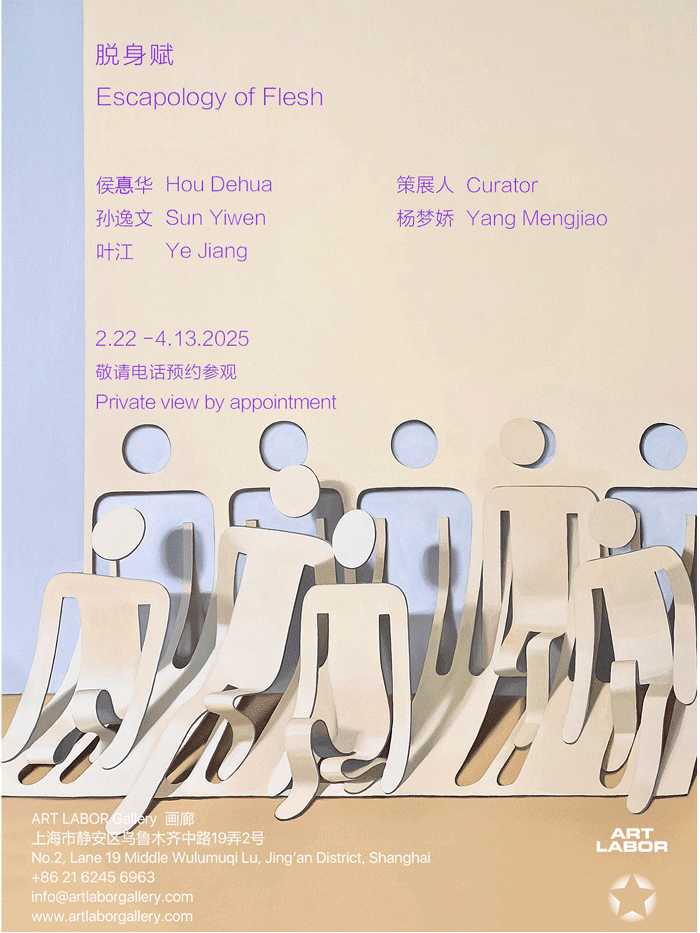Escapology of Flesh
ART LABOR Gallery is pleased to present the group exhibition Escapology of Flesh, curated by Dr. Yang Mengjiao. This exhibition showcases the recent works of three emerging artists Hou Dehua, Sun Yiwen, and Ye Jiang, making their debut at ART LABOR. The three rooms on the ground floor of the gallery will unfold a dialectic of “escape,” each corresponding to one of the three paths of mythology, reality, and the virtual. The exhibition will be on view from February 22nd to April 13th, 2025.
In the “Chronicles of the Iron-Power” series, Sun Yiwen deconstructs the “fitness myth” and reveals the dilemma of modern subjectivity within a paradoxical visual realm. The texture of the palm and the swelling veins form a dual narrative of biopolitics: the former points to the capillary infiltration of life power, while the latter reveals the physiological tremor of resistance. This surrealist struggle is no longer a simple physical confrontation but evolves into a “desire-production apparatus” within what Deleuze calls the “society of control.”[i] Here, muscular lines become Baudrillard’s “symbolic consumption”2 as a new currency, and body transformation morphs into an alternative battlefield for capital accumulation.
Ye Jiang’s “Human Form Icon” series directly confronts the deep paradoxes of survival reality. Several silhouettes “escape” from concrete, fleshed-out bodies to become the fundamental symbols of “being in the world.” Collective anonymous silhouettes form a perfect metaphor for Han Byung-chul’s “transparent society,”3 where seemingly free forms are, in fact, the new frontier of algorithmic colonization. The weightless human forms are trapped within the accelerated flow of reality, swaying and struggling.
Hou Dehua stages his work in virtual space, where digital modeling and noise language encode the human body as a form with no thickness, no interior—an empty shape. The noise, both a visual experience of the artist’s Visual Snow Syndrome and an interference phenomenon in digital images, symbolizes the blurred boundaries between truth and falsehood in the virtual world. The artist predicts that flesh and blood will eventually be broken down into data fragments and reassembled by algorithms into new subjective imaginations, reciting an endless chant of both praise and defamation.
—————————————–
[i] Deleuze’s “society of control” describes a shift from disciplinary societies (focused on institutions like prisons) to more pervasive, decentralized control. In this model, power is exercised through continuous surveillance and real-time data, influencing behavior outside of fixed spaces, shaping individuals’ actions in everyday life.
2 Baudrillard argues that in modern capitalist societies, consumption is no longer just about acquiring goods for practical use or necessity. Instead, consumption has evolved into a complex social process where the meaning and symbolism of goods are just as important, if not more important, than their actual use value. This shift is what Baudrillard calls “symbolic consumption.”
3 In his book “The Transparency Society” (2012), Han Byung-Chul explores how the constant demand for transparency—often promoted by digital technologies, social media, and surveillance systems—has reshaped modern life. He argues that this demand for transparency paradoxically leads to a loss of privacy, individuality, and depth in human relationships and society as a whole.

